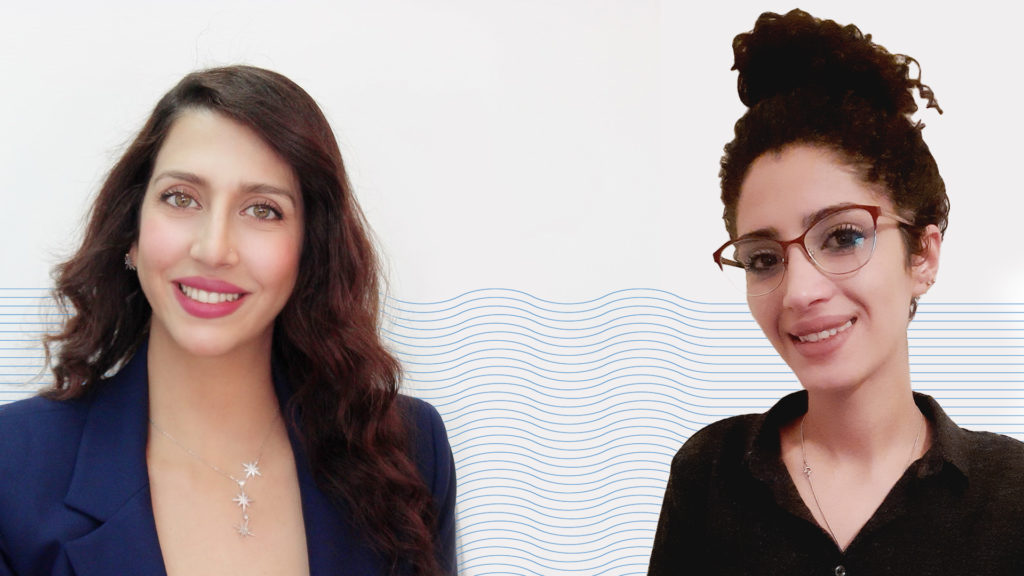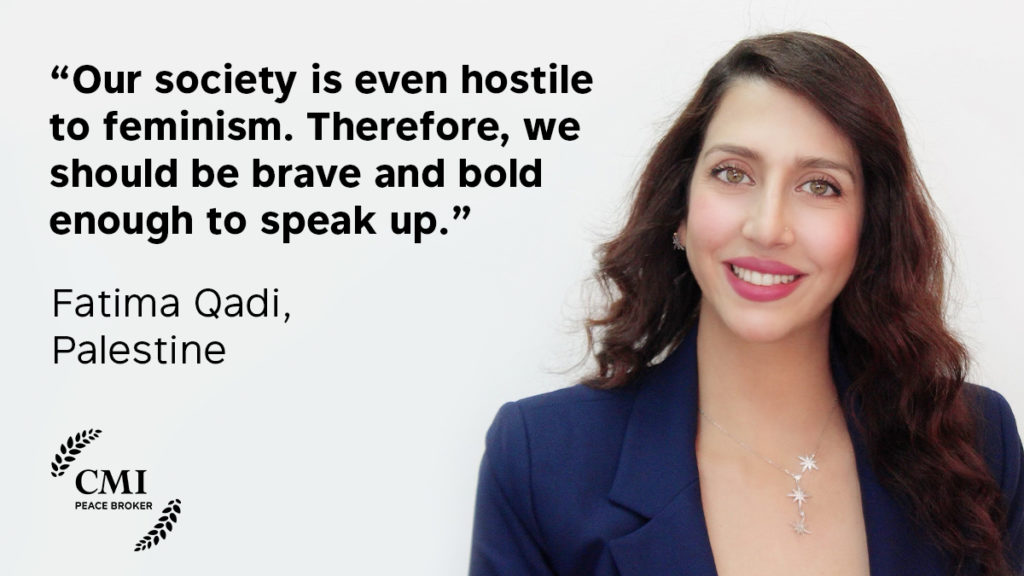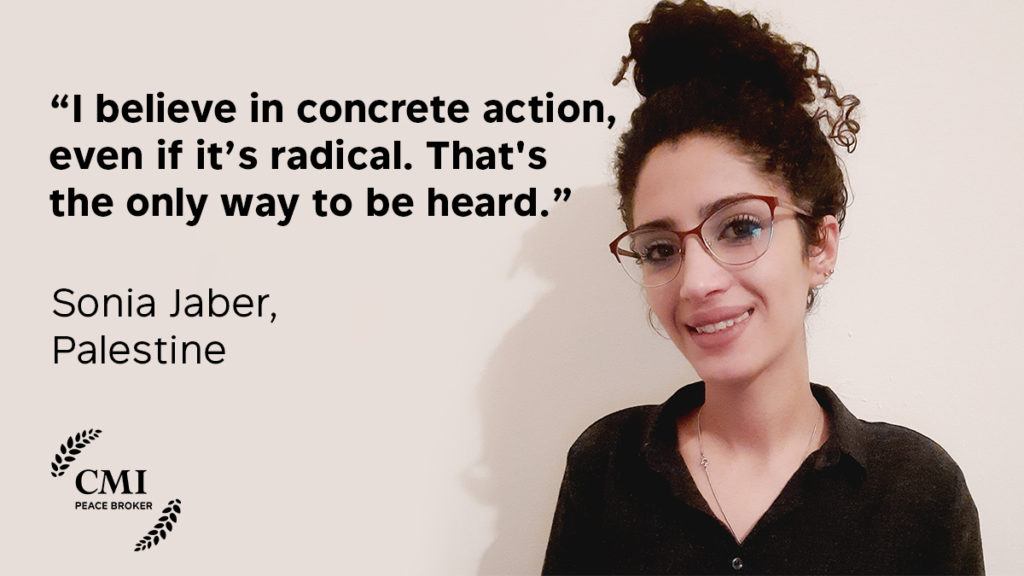Young Palestinians call for female activism: “Women should be bold and brave enough to speak up”
Within a strongly patriarchal society, Palestinian women continue face discrimination at home, work and in politics. Young women particularly feel disillusioned about the upcoming elections, the first in 15 years. On the occasion of International Women’s Day, two young Palestinian female activists share their views on how to bring about change.

Fatima Qadi and Sonia Jaber want to break the silence on discrimination against women in Palestine.
Fatima Qadi, 34
“Why do you need a pay increase? You’re just a girl who doesn’t have any responsibilities.”
Having graduated from university, Fatima Qadi had just landed a job. But the words of the company’s general manager made her quit. Apparently, she didn’t deserve to be paid the same salary as a man doing the same job.
The experience made Qadi fight back against the discrimination Palestinian women face at work. Now she is herself a living example that this fight pays off. Qadi has become an operations manager for an e-payments company in Ramallah in the West Bank. “I work in a sector that is mostly dominated by men. I want to be an example that women can take high-ranking positions in business life.”
Palestinian women continue to face many challenges due to the occupation, patriarchal society and the increased pushback to women’s rights and gender equality by traditionalist forces. The Covid-19 pandemic has made things worse, including increasing domestic violence.
Despite her young age, Qadi, who is 34, has advocated for women’s rights since she was 16. She now focuses on women’s economic and political empowerment. This involves organising trainings for women on how they can become financially independent. Women learn new skills to employ themselves or to cope with family members who prevent them from going out to work.
Qadi tells of a women who was struggling to find an income for herself and to be independent from her husband. In the training courses a new world opened up to her as she became inspired by others’ experiences. She learned to make handicrafts and to sell them online. “Now she is a qualified lady who can lead an independent life,” Qadi says.
“The most important thing for me is that financial independence is a way to total independence. If you are dependent on others, you cannot exercise your rights.”

In Palestine, politics is heavily male dominated, and young women above all are often excluded from it and feel disillusioned. Recently, Qadi has been working with groups of young women and men on how to increase women’s participation in the upcoming legislative elections, the first in 15 years. One specific task is to go through the electoral lists of independent candidates and see if young women from these groups would be willing to stand as candidates.
One positive change that could increase participation is the fact that the quota for women in the legislature has been raised to nearly 30 per cent. “But there is a long way to go to achieve equality in political life. Society might accept women’s participation in business, but not in political life. We need to be more active.”
Qadi says that the inherent problem in Palestine is that many women remain silent. “Our society is even hostile towards anything related to feminism. Therefore, we should be brave and bold enough to speak up and complain about wrong practices. If we don’t do it, we will never achieve our rights.”
Sonia Jaber, 26
Sonia Jaber, 26, works as a Project Coordinator for Masarat and lives in Ramallah in the West Bank. Masarat is a Palestinian centre for policy research and strategic studies, and a longstanding partner of CMI. “I see my work as concrete activism, and Masarat as an organisation through which I can feel that my voice gets heard”.
Jaber is currently working with CMI’s Women in Peacemaking team on a dialogue project to enhance women’s agency in dialogue efforts. There’s a need for Palestinian women representing different generations, religions and regions to come together to discuss the women’s movement. Jaber sees dialogue as an important way in advancing women’s rights in Palestine.
Jaber explains that there are many limitations for women in Palestine, brought about by the Israeli occupation and patriarchal system. The Palestinian women’s movement is vibrant, but lately the generational gap has become increasingly evident. “The older generation of women actors represent social and political elite, and have lost connection with the grassroots level.”
She says that, although young women respect the work done by the previous generations, they just want to promote women’s rights in different ways than before. “I believe in concrete action, even if it’s radical. That’s the only way to be heard”.

Lately, there has been much discussion about the current laws in Palestine and how they do not always protect women. “For instance, if I have children and I want to leave the country for travel I have to get my husband’s written approval.”
There have been some instances where women do not report cases to the police as they fear they would not receive fair treatment by the judicial system.
Jaber says that her views on activism have changed over the last couple of years. She now sees activism as work towards changing the Palestinian reality, socially and politically. Concrete and sometimes even radical actions are needed to bring about real change, but Jaber stresses that violence is not a solution.
“To be heard you have to use same tools used by those in power, whether it’s via academia or social media. But if you resort to violence, they will only turn against you”.
Read more here on how to advance women’s participation in Palestine. The recommendations are based on consultations that CMI and its partner Masarat conducted with Palestinian women.